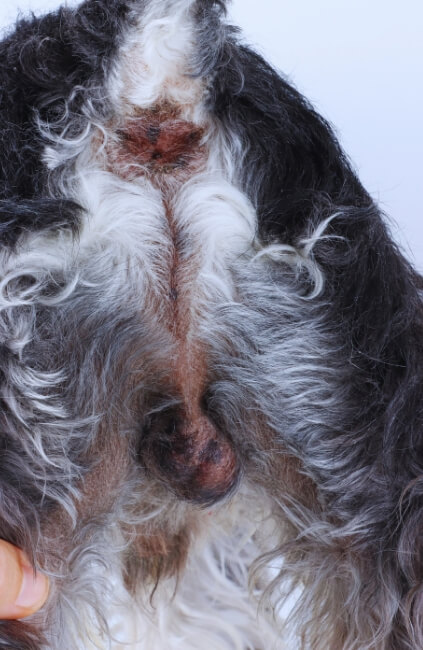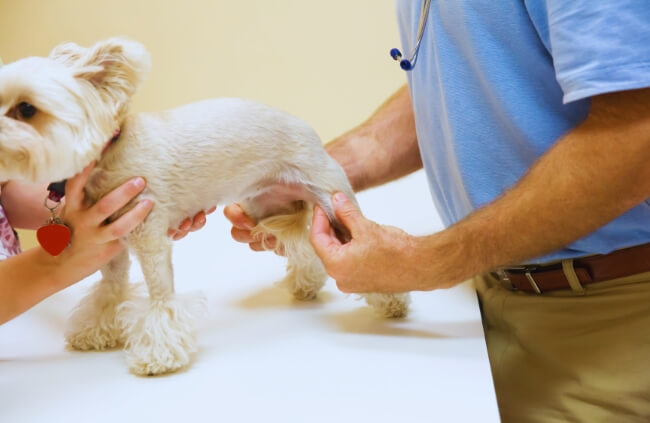Knowing that your furry friend has an infected or ruptured anal glands can be very concerning. A ruptured anal glands in dogs is serious, however, there are treatments available. Once you understand the causes, prevention methods, and available treatments, you can help your pet take care of their anal glands.
More...
What is a Ruptured Anal Glands?

A ruptured anal gland in dogs happens when the small glands near the anus burst open. These glands produce a smelly, scent-marking fluid that is used to mark territory during bowel movements. If the glands get blocked, infected, or inflamed, they can swell and burst.
Ruptured anal glands in dogs can be very painful. If your dog has a ruptured gland, you should get help from your veterinarian to prevent an infection. Treatment usually involves cleaning the gland, giving antibiotics, and pain management. In extreme cases, surgery is required.
How Common is an Anal Glands Rupture in Dogs?
While not uncommon, a ruptured anal gland in dogs is more prevalent in smaller breeds. However, dogs of any size or breed can develop problems with their anal glands.
Signs of Anal Gland Issues
Recognising the signs of anal gland issues in dogs is crucial for early detection. Below are some of the things you should look out for.
- Scooting
One of the most common symptoms is scooting. This is when a dog drags its rear end on the ground or floor. This behaviour is a result of discomfort or itching caused by the infected anal glands.
- Licking
Dogs may excessively lick or bite at their bottom in an attempt to relieve discomfort.
- Odour
You may also notice a foul odour emanating from their dog's rear end. This is often a sign of infected or ruptured anal glands in dogs.
- Swelling
Visible swelling or redness around the anus may also indicate inflammation or an abscess.
- Straining
If your dog is straining when they defecate, this may be caused by an infection in the anal glands. They may also whimper or cry.
- Trouble Sitting
Dogs that have infected anal glands may have trouble sitting. You may notice that they keep getting up and down or are reluctant to sit. They may also keep their tail tucked between their legs.
- Blood or Discharge
Another indication of an infected anal gland is blood or discharge on the dog’s feces.
- Diarrhoea and Constipation
Anal gland issues can cause your dog to have diarrhoea or be constipated.
- Loss of Appetite
Since your dog is in pain, they may not want to eat. If your dog ever loses its appetite and refuses to eat, you should contact your vet.
Common Causes of Anal Gland Problems
Anal gland problems in dogs can be due to various underlying causes.
1. The primary cause is insufficient expression of the anal glands. Glands are designed to naturally release a small amount of fluid during bowel movements.
This is a way to mark their territory and communicate with other dogs. However, if the glands do not empty properly, they can become blocked or impacted.
2. Dietary habits also play a significant role in anal gland health. A diet that lacks enough fibre can result in soft stools. The stool will not apply enough pressure to the anal glands during defecation.
As a result, the glands may not empty completely. This can cause blockage and inflammation, which leads to ruptured anal glands in dogs.
3. Certain breeds are more prone to anal gland problems than others. Breeds with short, stocky builds, such as Jack Russell Terriers and Bulldogs, are more susceptible due to their anatomy. Additionally, dogs with allergies and other health conditions may experience anal gland inflammation.
Preventing a Ruptured Anal Glands in Dogs
Prevention is key when it comes to anal gland health in dogs. While some factors, like breed, cannot be changed, there are some things you can do to reduce the risk of ruptured anal glands in dogs.
- Regular Gland Expression
Having your dog’s anal glands regularly expressed can help prevent blockages and potential ruptures. This can be done by a veterinarian or a trained groomer.
- High Fibre Diet
Feeding your dog a high fibre diet can promote regular bowel movements, which can help prevent anal gland issues.
- Weight Management
A dog that is at a healthy weight will have a reduced likelihood of anal gland problems. Being overweight can contribute to gland blockages.
- Schedule Regular Checkups
Scheduling regular checkups with your vet is crucial for maintaining your dog's overall health.
Dog Anal Glands Rupture Treatment

If your dog has a ruptured anal gland, prompt veterinary care is essential. Dog anal glands rupture treatment may include:
- Gland Flushing
- Antibiotics
- Anti-inflammatory Drugs
- Steroids
- Pain Management
- Surgery
Removal of Ruptured Anal Gland in Dogs
The removal of ruptured anal glands in dogs can be performed by veterinarians. Removal is sometimes recommended in serious cases where there are severe or chronic issues with the anal glands.
Surgical removal can effectively alleviate symptoms and prevent recurring issues. However, it is considered a last-resort option. This is due to the fact there are always risks associated with anaesthesia and surgery.
Home Care Tips
While some aspects of anal gland care are best left to your veterinarian, there are some things you can do at home.
- Regularly checking and monitoring your dog's anal glands for any signs of swelling, redness, or discharge.
- Provide your dog with a high fibre diet.
- Keep your dog clean and maintain good hygiene practices.
Understanding the Risk of Death
A ruptured anal gland in dogs itself is not typically life-threatening, complications can arise if left untreated. These may include severe infections, abscess formation, and even illness.
With prompt veterinary care and proper treatment, the prognosis for dogs with ruptured anal glands is generally good.
Understand the Causes, Symptoms, and Treatment for a Ruptured Anal Glands in Dogs
Dealing with a ruptured anal gland in dogs is never something you want to do. But with proper understanding, preventive measures, and timely veterinary care, you can manage this issue and keep your furry companion comfortable.
Remember, a ruptured anal gland in dogs is a manageable condition when addressed promptly and with care.
